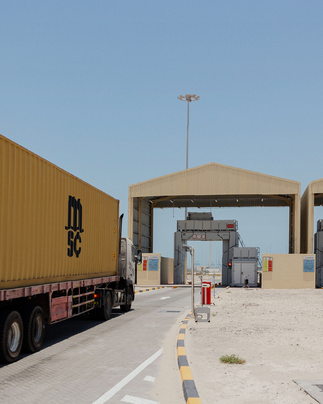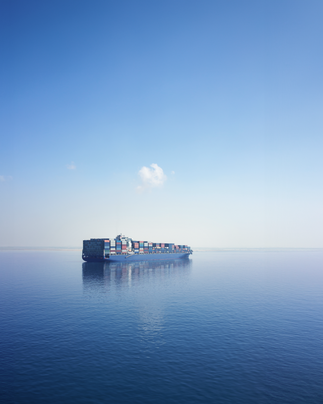The General Administration of Abu Dhabi Customs continued its pioneering efforts to protect the economy and society’s safety during the Covid-19 pandemic. These efforts were in line with the leadership’s directives to meet the requirements of the local basic commodities market for food and medical supplies, while applying the highest precautionary and preventative measures to maintain the health and safety of employees and inspectors working on the front lines.
Abu Dhabi’s non-oil foreign trade sector demonstrated agility and preparedness, and achieved exceptional results during the first nine months of this year despite the Covid-19 pandemic, supported by sophisticated digital logistical infrastructure, and ongoing training for customs employee as well as an advanced network of roads, airports and ports in line with international specifications.
The value of Abu Dhabi’s foreign non-oil trade during the first nine months of this year was AED 151.18 billion, distributed between imports worth AED 69.33 billion, exports worth AED 55.37 billion, and re-exports worth AED 26.48 billion.
The customs transactions completed by the General Administration of Customs of Abu Dhabi recorded around 788,699 transactions during the first nine months of this year, supported by the administration's launch of various smart enablers that contributed to the smooth completion of customs clearance operations and transactions.
Transportation methods used to transport foreign trade were also diversified, with airborne trade accounting for AED 51.35 billion, seaborne trade accounting for AED 59.38 billion, and overland trade accounting for AED 40.45 billion.
Abu Dhabi Customs, across all its sectors, adopted a strategic plan to ensure the continuity of supply chains’ flow, and to facilitate the movement of trade across Abu Dhabi during the Covid-19 pandemic
Rashid Lahej Al-Mansouri, Director General of the General Administration of Abu Dhabi Customs
For his part, His Excellency Rashid Lahej Al-Mansouri, Director General of the General Administration of Abu Dhabi Customs, said that Abu Dhabi Customs, across all its sectors, adopted a strategic plan to ensure the continuity of supply chains’ flow, and to facilitate the movement of trade across Abu Dhabi during the Covid-19 pandemic. This was achieved thanks to the 24/7 work of all customs border centres to ensure uninterrupted supply in the emirate, and facilitate the flow of goods into Abu Dhabi markets.
His Excellency added that the leadership’s directives have helped to strengthen Abu Dhabi’s leading position on the global trade map following the launch of various stimulus packages and facilities for companies, in addition to the development of innovative customs services using modern technologies, which have in turn impacted the performance of employees and inspectors. The General Administration of Abu Dhabi Customs also continued to deliver training for employees to raise awareness of the latest smuggling methods using artificial intelligence techniques.
Abu Dhabi's foreign trade helped diversify its global and regional markets, with the Kingdom of Saudi Arabia Abu Dhabi’s primary commercial partner. Trade between the nations amounted to AED 32.22 billion, followed by the United States of America with AED 10.70 billion, Italy with AED 9.85 billion, China with AED 9.83 billion, Hong Kong with AED 7.24 billion, Switzerland with AED 7.22 billion, Japan with AED 6.61 billion, India with AED 5.83 billion, the United Kingdom with AED 4.11 billion, and Kuwait with AED 4.08 billion.
Pearls, precious stones and precious metals accounted for the highest grossing commodity, amounting to AED 27.64 billion, showing growth of 157% compared to the same period last year, which amounted to AED 10.76 billion. This was followed by machinery, recording devices, and broadcasting images and sound equipment worth AED 25.26 billion – an increase of 10% compared to AED 22.90 billion traded during the same period last year. Ordinary metals and their artefacts amounted to AED 23.72 billion, followed by transport equipment amounting to AED 22.23 billion.
This was followed by plastics and their articles and rubber and articles thereof worth AED12.72 billion, by-products of chemical industries and related products worth AED 10.67 billion, food and beverage products worth AED 4.79 billion, plant products worth AED 4.38 billion, live animals and animal products worth AED 3.80 billion, and mineral products worth AED 3.54 billion.
Pearls, precious stones and precious metals accounted for the highest grossing commodity, amounting to AED 27.64 billion, showing growth of 157% compared to the same period last year
During the third quarter (Q3) of this year, Abu Dhabi's non-oil foreign trade achieved growth of 10% compared to the same period of the last year, to reach AED55 billion, with imports of AED 21 billion, exports of AED 25 billion, and re-exports of AED 9 billion.
Gold and jewellery contributed AED15bn in Q3, followed by machinery, appliances and electrical equipment and parts thereof, which amounted to AED 9 billion. This was followed by minerals and their articles amounting to AED 7 billion, and transport equipment amounting to AED 5 billion.
The Kingdom of Saudi Arabia maintained its lead position as one of Abu Dhabi’s most important strategic foreign trade partners during Q3, with trade amounting to AED 10 billion, followed by Italy with AED 8 billion, Hong Kong with AED 7 billion, the US with AED 4 billion, and China with AED 3 billion.
Abu Dhabi’s non-oil foreign trade passing through Abu Dhabi Customs ports during Q3 was also diversified across airborne trade amounting to AED 23 billion, seaborne trade amounting to AED 19 billion, and overland trade amounting to AED 13 billion.







